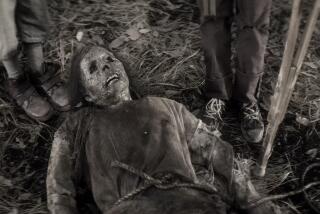Will Controversy Over Sins of ‘Padre’ Translate?
- Share via
Executives at Samuel Goldwyn Films, which just acquired for U.S. distribution the Mexican film “El Crimen del Padre Amaro” (The Crime of Father Amaro), say they are not afraid of any controversy the film might generate here despite the firestorm it caused in its home country.
The company, which will release the film sometime in November to a target audience of Latinos and foreign-film buffs, is capitalizing on headlines the movie generated this month as Mexico’s Catholic leadership and conservative social groups tried to ban it. Recent scandals within the Catholic Church involving accusations of pedophilia and molestation also make the content of the film, about a priest who impregnates a 16-year-old parishioner, particularly timely, said Meyer Gottlieb, president of Samuel Goldwyn Films.
“It deals with issues that are topical, and they are issues that need to be addressed,” Gottlieb said.
The studio, known more for lower-profile, less edgy material, such as last year’s “Tortilla Soup,” is branching out to include more radical fare, including this year’s German psychological drama “Das Experiment” and “Padre Amaro,” as well as such family fare as “Little Secrets.”
Carlos Carrera’s “Padre Amaro” depicts a small-town Mexican priest who struggles with his celibacy vows. Senior clerics in Mexico pressured the government of President Vicente Fox to ban the film, which is rated B-15 (not recommended for children under 15). Instead, it opened in 358 theaters across the country, a record for a Mexican film. Taking in close to $6 million in its first two weeks, it has become one of the highest-grossing Mexican films ever, on track to surpass the country’s 1999 mega-hit, “Sexo, Pudor y Lagrimas” (Sex, Shame and Tears), which ended up grossing $13 million.
Gottlieb said “El Crimen” is one in a string of high-quality films Mexican filmmakers have been churning out over the last five years, including Salvador Carrasco’s epic “The Other Conquest,” Alejandro Gonzalez Inarritu’s Oscar-nominated “Amores Perros” and Alfonso Cuaron’s road romp “Y Tu Mama Tambien.”
The film stars Gael Garcia Bernal, one of Mexico’s most popular young actors, as the errant Father Amaro.
The movie will be shown in Toronto next month. Gottlieb said he is undaunted by the controversy it may stir within this country’s Catholic hierarchy.
“It’s not anti-Catholic,” Gottlieb said. “This picture does not make fun of the church in any way. It deals with the frailties of human beings. I am hoping that everybody will see this film for what it really is.”
Tod Tamberg, spokesman for the Los Angeles Archdiocese, said officials there have not been contacted by the studio, nor do they plan any protests at this point.
But if history is any guide, the company should be prepared for some backlash among Catholic groups. In 1988, thousands of protesters turned out at Universal Studios to protest Martin Scorsese’s “The Last Temptation of Christ,” which they claimed slandered Jesus Christ and other biblical figures. Protesters picketed, in small numbers, outside theaters in New York and L.A. for weeks. In 1995 Miramax ran into problems with “Priest,” which some Catholics deemed offensive because it portrayed priests as having sex with women and with men.
Then in 1999, Kevin Smith’s “Dogma” became the target of protests by the New York-based Catholic League for Religious and Civil Rights, which demanded that the Walt Disney Co. dump Miramax Films. Miramax co-chairmen Bob and Harvey Weinstein personally bought back the rights to the film for a sum reportedly between $10 million and $14 million and sold it to Lions Gate Films. The film was picketed at its premiere.
More to Read
Sign up for Essential California
The most important California stories and recommendations in your inbox every morning.
You may occasionally receive promotional content from the Los Angeles Times.













